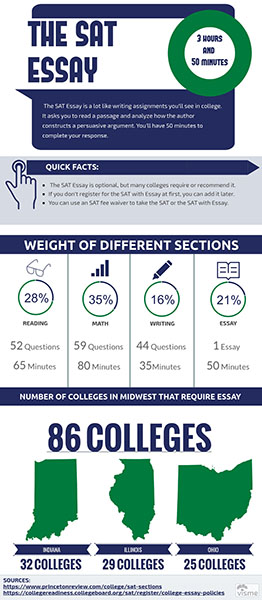Include the essay on your SAT, counselor says
Pivonka cites advantages of writing the essay on college admissions test
Throughout the course of their schooling, every student will undeniably write numerous essays. However, with at least one standardized test, they are given a choice.
When it comes to deciding whether to take the SAT essay, students may find themselves at a crossroads. Not taking the essay would save time, as the essay portion adds an extra 50 minutes to the test, and money, as opting to take the essay costs an extra $12, but choosing to take the essay could look better on a transcript. Ms. Kathy Pivonka, director of guidance and college counselor, says students should take the SAT with the essay. She said, “The recommendation I think most of the college counselors in this office would give is take at least one test, whether it’s the SAT or the ACT, with writing.”
Some students feel that taking the essay when their top college doesn’t request it is unnecessary. But Pivonka said, “There are some schools that will require it and some schools that won’t require it. For example, if you’re a junior who is taking the SAT or ACT, you don’t know all the schools you are going to apply to yet. We don’t want students to wait until senior year and then find out they took (the SAT or ACT) without (an essay) only to see their Number-1 school requires it. Usually with the first round you take it, we (recommend you take the essay portion) so you have a score. It depends on what the school would like to see included in your test scores.”
For senior Megan Wolcott, this is why she chose to take the SAT with the essay. “I took the essay because some of the colleges (I looked) at require it,” she said.
Pivonka shared her insight on why certain colleges require an essay score to be recorded and why some do not. “I think that when it was required, (colleges) liked getting an extra writing sample from a student. Now that it’s optional, if they already have a sufficient writing portion like the (common application) or their specific application, they are getting enough adequate information from the student. The schools that tend to want that writing sample, (from the SAT or ACT), want a pure sample. Nobody helped the student with it, it wasn’t tweaked by a teacher or proofed by a counselor.”
Wolcott and Pivonka both had good things to say about the essay. Wolcott said she felt prepared “because I knew what to expect due to the essay prompts we did in English class.”
Pivonka said, “If a school requires it and the student is a good writer, it can maybe offset the other scores, especially in the English or reading areas.”
However, like two sides to a coin, the essay portion of the test “could hurt the student if they aren’t true and honest on their application in their writing. If it’s not their own work, the SAT or ACT essay could show the difference. It’s almost a side note. Schools are going to focus first and foremost on the transcript, the grade trends, the rigor of coursework, more so than the test scores even though that is a very key point of the application process,” Pivonka said.
Pivonka and Wolcott provided similar suggestions regarding the SAT essay.
Wolcott said, “I think students should read what the essay prompt is telling you and answer the question fully.”
Pivonka said, “Be aware of what schools are going to require it. If you don’t have a list together, don’t take a chance. Make sure you have a score for the essay on your application. Be familiar with the format of the essay. The format has changed over the years. It’s changed a little bit in what they expect. Be familiar about what the expectation is. I would say that about the entire test.”  Liam Keenan
Liam Keenan







